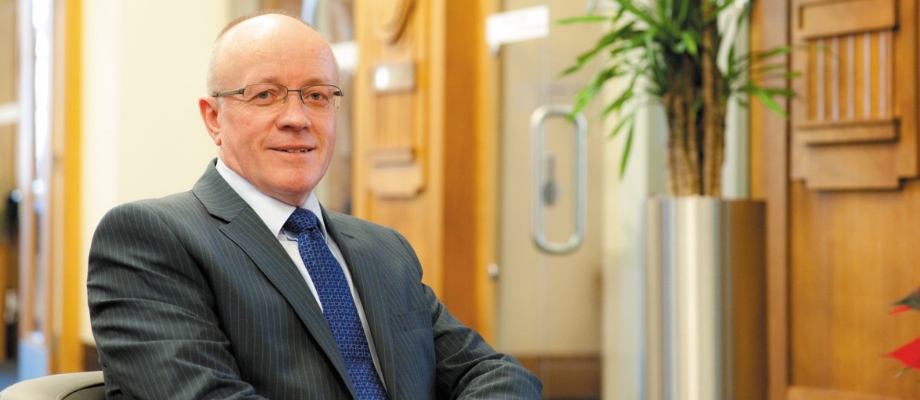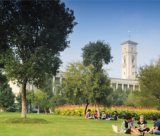
Chris Jagger — a reflection on 23 years at the University
April 12th, 2018
Chris Jagger, Chief Estates and Facilities Officer, retires at the beginning of May 2018. Here, we take a look back over his 23 years at the University.
The University of Nottingham was a very different place when Chris Jagger joined as Director of Estate Management in 1995. At that time, the University was in the final stages of acquiring the first 20 acres of what would become Jubilee Campus; King’s Meadow Campus housed the Central TV offices, newsroom and studios — home to Blockbusters and The Price Is Right rather than our HR and Finance departments; and the campuses in China and Malaysia were but a twinkle in then Vice-Chancellor Sir Colin Campbell’s eye.
Chris, a chartered engineer with experience in the construction industry and project management, had previously worked abroad in the Middle East. His last role before coming to the University saw him working on the Inland Revenue building at Nottingham’s Castle Meadow.
He reported to the Vice-Chancellor, Sir Colin, who Chris describes as: “The architect of significant change at the University. He established a global footprint when no other University was coming close.”
“David Greenaway provided continuity and led the realisation of the full vision for the Asia campuses, This was alongside continued growth in the UK, recognition as a global university and consolidating a reputation for quality on a sound financial footing.”
Chris has always seen his role as interpreting the vision of the Vice-Chancellor and putting in place the infrastructure needed to deliver that vision in China, Malaysia and the UK. He takes pride in developing plans that are affordable but flexible, and able to respond to changes in both delivery parameters and the internal and external environments.
These areas within the University, and in the broader higher education sector, have fluctuated considerably in Chris’s 23 years here. How has he managed that change?
“I look at the University through rose-tinted glasses — I don’t see problems, I see challenges,” says Chris. “My wife says I’m a robot. I’m solutions driven — adaptive. If you constantly adapt, you shouldn’t ever be caught off guard.
“I also try not to be insular, I look beyond the sector. I look at what’s happening on a global scale.”
A new approach
He’s instilled this approach since the very beginning of his time here, opening up the planned development of Jubilee Campus by running an architectural competition. Council at the time was very wary of this approach, as it meant investing with no guarantee of success.
“I remember sitting in front of Council, convincing them that this was the right approach. This just wasn’t done in this University then, I had to persuade them it was the right thing to do. The Jubilee Campus couldn’t replicate the beautiful parkland setting of University Park but would need its own quality credentials and a strong identity to be successful.”
The gamble paid off. Jubilee’s iconic buildings are now an integral part of the University’s landscape.
Architectural competitions have become a mainstay of the University’s estate development process. “It brings a range of different solutions to one building brief,” says Chris. “It’s enhanced the quality of the architecture and enabled an exemplar approach for environmental sustainability.”
Sustainability has been at the core of Chris’s work over the past 23 years, both on campus and in the wider world. Chris has been a key part in the drive to collect and publish sector benchmarking data on estates and premises performance, and on environmental factors such as waste, energy and carbon emissions.
“Understanding the data is vital to the process of making improvements. You can’t make improvements on your carbon reduction, for example, if you don’t have benchmarking and comparison data.”
And the data is there for everyone to see and act upon. Energy reports dating back to 2004/5 are available on the sustainability website, along with information on how older buildings are being refurbished to make them more efficient and advice on how individuals can help reduce carbon and energy use in their departments.
Building sustainability
The commitment to sustainability does not stop at making improvements to older buildings and ensuring new buildings are constructed to exemplar standards. Newer buildings on our campuses — from the Centre for Sustainable Energy Technologies at UNNC to the Centre for Sustainable Chemistry at Jubilee — are designed as adaptable environments in which to carry out teaching and research. They are also designed to showcase new and emerging technologies and innovation, reminding occupants and educating visitors on our efforts to be environmentally responsible.
“We’re a University,” says Chris. “Education is important. We own our buildings and we’re in a position to demonstrate the technologies which are developed within them. We can monitor performance, adapt and provide feedback. These buildings don’t just house research, they contribute to it.
“We want to drive curiosity and stimulate conversation. The physical form of the building is an active visible reminder of what we’re trying to achieve — timber as a construction material, grass roofs, straw bales as insulation, solar panels — they articulate the building’s credentials. Staff and students have touchpoints to their physical environment. It’s a fundamental part of the Nottingham experience.”
Financial sustainability has also been a focus for Chris, managing the University’s holdings in a way that offers future stability. University land in Newark, Bramcote and Yorkshire was sold off, allowing the University to invest in core assets without over-borrowing.
“We maintain lower borrowing levels than our peer groups. We also have alternative income streams — The Orchard hotel, our conferencing facilities, the innovation park. These activities provide investment income, protecting us from the volatility of traditional funding streams.”
A world-class team
Over the years Chris’s responsibilities have expanded. He retires from his role as Chief Estates and Facilities Officer, a member of the University Executive Board, and responsible for more than 1,200 staff.
He has centralised estate and hospitality support services during his tenure, his workforce expanding with his remit.
“We provide a world-class service but that wouldn’t be possible without a world-class team. Cleaners, gardeners, surveyors, caterers — everyone plays their part. It’s been a privilege to be part of that team.”
Holistic approach
The University has tripled in size since Chris joined and he’s overseen the development of all our campuses — which is his favourite building?
“I don’t have a favourite. I’m more proud of our holistic approach and that we’ve managed to translate the complex infrastructure needs of the University. Research, teaching, growth in student numbers, sports and community needs, supporting staff — the environment and our buildings are an enabler to accelerate delivery of the strategic plan.
“The fact that we’re a campus University has been crucial to this. If you’re in a city centre, you can either refurbish a building or knock it down and build another. We have the space to expand incrementally with creative options.”
Chris feels fortunate to have been empowered to be both innovative and creative in the development of the University’s campuses, in the UK, China and Malaysia.
“I would like to think I’m leaving the University in a better place and I hope my decisions have served the University well. The University has scope to expand without needing to invest heavily in physical premises, and can look to address the new investment needs arising in higher education, like blended learning, research equipment and re-focusing on digital technologies and the benefits they can bring to students and staff.”
The Vice-Chancellor, Professor Shearer West, said: “Over his 23 year career at Nottingham, Chris has had numerous achievements — not least in delivering an estate which provides the highest quality environment for our staff and students to research, teach and study. I would like to thank him for his dedication to the University and wish him an enjoyable and well-earned retirement.”
Linda Goodacre has been appointed to the role of Director of Estates & Facilities and will take up post on Monday 16 April 2018.
One Comment
Leave a Reply
Other

University of Nottingham China celebrates 20 years
At the University of Nottingham, we embrace diversity in culture, spirit and thinking. It’s why we […]

Digital Accessibility training courses: book now
Sign up for University of Nottingham courses that offer support with creating accessible materials for teaching […]


April 13th, 2018 at 11:24 am
David A Walker
Chris
I wanted write and express my appreciation of your major contribution to University life as a graduate and academic involved in this University since the 1970s.
We met whilst preparing for the first life cycle and have enjoyed a robust humorous and stimulating relationship since.
I read this summary of your work and agree with its analysis. I know the campuses well having been associated with them since the early 70s.
At that time as a student in the new medical school which did not move into the bespoke building at QMC until 8 years after the medical school was launched it was obvious to me that project management was a topic that needed further work.
Not a problem with modern approaches to building projects that have seen the transformation of the Universities’ campuses during your time here.
Impressive.
At the same time I have been watching some comments from the Jaggerettes sharing cycle stories.
Where do these two people meet? Engineer and Jaggerette leader
Well they meet in your highly energised and warm personality where people matter and every option is always worth considering but at the end of the day sometimes the Garden Centre wins as a coffee venue more often than it should!
Enjoy changing the way you work and live your life with all the opportunities and enjoyment that will bring.
I have started that journey and have no regrets.
Your legacy is set in stone around us all at the University across the world
Best wishes
David Walker